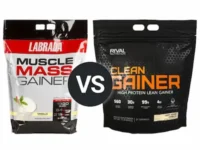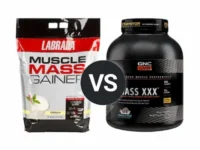Knowledge BaseYou're Questions Answered
Who should use mass gainer protein powders?
Mass gainer protein powders are specialized dietary supplements formulated to help individuals increase their caloric and protein intake. They are particularly beneficial for those who struggle to meet their nutritional needs through regular food consumption alone. These products are typically high in calories, carbohydrates, proteins, and sometimes fats, making them an effective tool for the specific purpose of maintaining or gaining weight and building muscle mass. Below, we outline the groups of people who may benefit most from using mass gainer protein powders, along with considerations for their use.
Who Should Use Mass Gainer Protein Powders?
Athletes and Bodybuilders
Athletes and bodybuilders who are looking to increase muscle mass and size often require higher caloric and protein intake to support their training and recovery. Mass gainers provide a convenient and efficient way to consume additional calories and protein, which can be challenging to achieve through whole foods alone, especially when training intensity is high. A study published in the Journal of the International Society of Sports Nutrition found that consumption of a mass gainer supplement led to significant increases in muscle mass, strength, and power in resistance-trained men compared to a placebo group1. This makes mass gainers a valuable tool for athletes aiming to enhance their physique and performance.
Individuals with Fast Metabolism
Some people naturally have a fast metabolism, which means they burn calories at a higher rate and may find it challenging to gain weight. For these individuals, mass gainers can help provide the necessary caloric surplus to promote weight gain. The high calorie content in mass gainers can help overcome the difficulty of consuming enough food to meet caloric needs, making them a practical option for those looking to increase body weight.
Underweight Individuals
Underweight individuals, whether due to genetic factors, medical conditions, or inadequate dietary intake, may benefit from the additional calories and nutrients provided by mass gainers. These supplements can help bridge the gap in their nutritional intake, supporting healthy weight gain and improving overall well-being. It is important for underweight individuals to consult with a healthcare professional or nutritionist to ensure that their weight gain approach is balanced and meets their specific health needs.
People with Increased Caloric Needs
Certain situations, such as recovering from illness or surgery, can increase an individual's caloric and nutritional needs. In these cases, mass gainers can provide a concentrated source of calories and nutrients, aiding in recovery and preventing muscle loss. However, it's crucial to use these supplements under medical supervision to ensure they are appropriate for the individual's health status.
Considerations and Potential Downsides
Caloric and Nutritional Content
Mass gainer protein powders are often high in calories, primarily from carbohydrates and sometimes fats. While this is beneficial for those looking to gain weight, it can also lead to excessive caloric intake if not managed properly. This can result in unwanted fat gain rather than lean muscle mass. Therefore, it's essential to incorporate mass gainers into a balanced diet and exercise program that aligns with one's fitness goals.
Ingredient Quality
Some mass gainers may contain added sugars, artificial flavors, and other ingredients that are not ideal for overall health. It is recommended to carefully read the ingredient label and choose a product that uses high-quality ingredients and aligns with dietary preferences and health goals. Opting for products with minimal added sugars and artificial additives can help ensure a healthier choice.
- Kerksick, C. M., Rasmussen, C. J., Lancaster, S. L., et al. (2006). The effects of protein and amino acid supplementation on performance and training adaptations during ten weeks of resistance training. J Int Soc Sports Nutr, 3(1), 1-13. doi: 10.1186/1550-2783-3-1-1. PMID: 18500968; PMCID: PMC2129150.
Related Questions
Related Reviews
Your Answer
We are a participant in the Amazon Services LLC Associates Program, an affiliate advertising program designed to provide a means for us to earn fees by linking to Amazon.com and affiliated sites.



